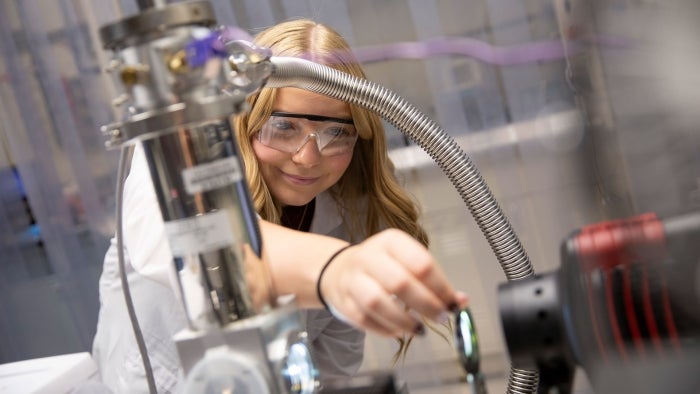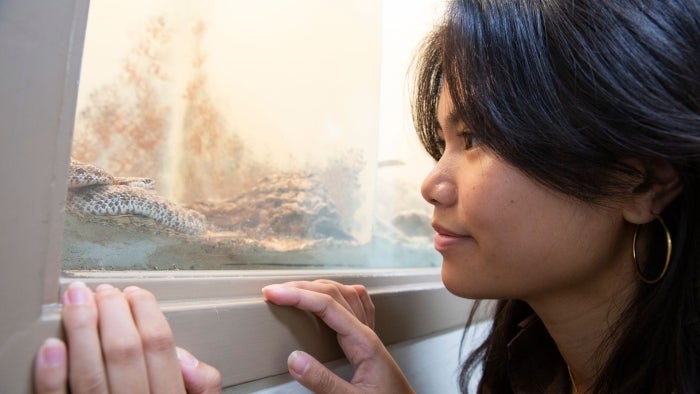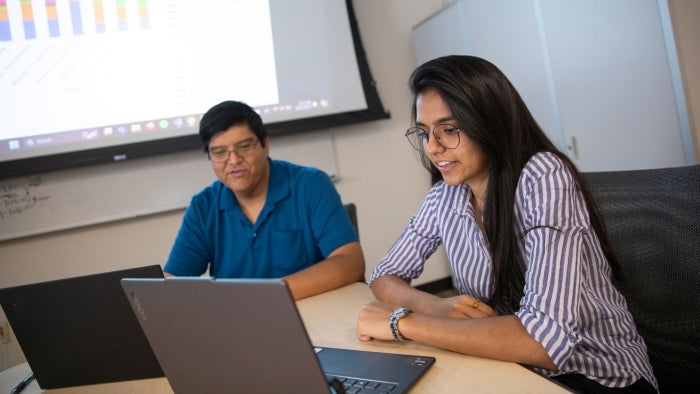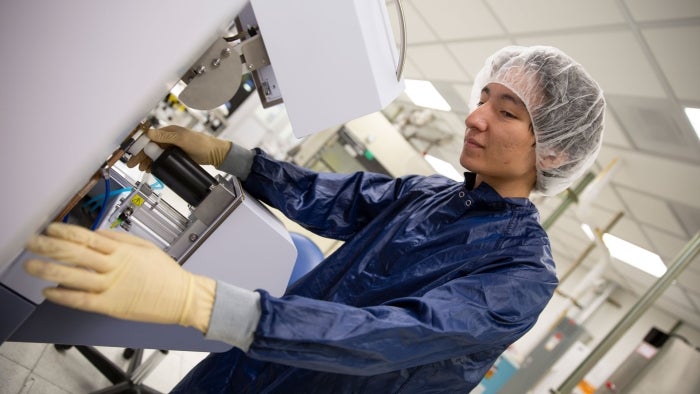ASU student researchers get early, hands-on experience in engineering research

Daniel Abreu (left), an electrical engineering senior in the Ira A. Fulton Schools of Engineering at Arizona State University, works with Nick Rolston (right), an assistant professor of electrical engineering, on research to better understand semiconductor aging. As part of the Fulton Undergraduate Research Initiative, Abreu is one of many students helping to solve real-world problems through use-inspired research. Photo by Erika Gronek/ASU
Using computer science to aid endangered species reintroduction, enhance software engineering education and improve semiconductor material performance are just some of the ways Arizona State University students are addressing real-world challenges through hands-on research.
Learn more
Read more about these and other student researchers presenting work at the Fulton Forge Student Research Expo on Full Circle.
Undergraduate and graduate students in the Ira A. Fulton Schools of Engineering at ASU have several opportunities to conduct research that has real-world impact. Through the Fulton Undergraduate Research Initiative, also known as FURI, the Master’s Opportunity for Research in Engineering, or MORE, program and the Grand Challenges Scholars Program, or GCSP, research stipend opportunities, students enhance their ability to innovate, think independently and solve problems in their communities.
Each semester, students who participate in FURI, MORE and the GCSP research stipend program are invited to present their findings at the Fulton Forge Student Research Expo. Below, learn more about three of the more than 115 student researchers participating in the fall 2024 event, which is open to the public, on Monday, Nov. 18, from 1 to 3 p.m. at the Memorial Union on ASU's Tempe campus.
Sofia Vargas
Sofia Vargas, a computer science sophomore, is developing a computer program with a graph coloring data visualization algorithm to help determine optimal sites for endangered species reintroduction, particularly in Arizona.
Question: Why did you choose the project you’re working on?
Answer: While I was researching background knowledge for my project, I learned that previous reintroduction efforts had mixed results due to the environmental factors the species were reintroduced to, whether it be food, predators or other factors. I saw this as an opportunity to try to solve real-world problems in sustainability with computer science and math.
Q: How will your research project impact the world?
A: I hope that my project will impact the world by making species reintroduction efforts more efficient and effective. The more successful reintroduction efforts are, the stronger our biodiversity becomes, ultimately making our ecosystem more sustainable.
I hope first that my research project can make an impact on our local community. By working on cases for species that are native to Arizona, we can see the results of the project directly and determine what needs to be changed.
Q: What has been your most memorable experience as a student researcher?
A: My most memorable experience was being able to talk to people in the U.S. Fish and Wildlife Service. Having this opportunity made me feel that my research project could actually have a tangible impact on our local community and ecosystem.
Learn more about Sofia Vargas’ fall 2024 GCSP research stipend project.
Devanshi Tushar Prajapati
Software engineering graduate student Devanshi Tushar Prajapati is developing a code analysis method to help instructors better teach programming skills.
Question: How will your research project impact the world?
Answer: The impact will be better course structures and methods to make learning software engineering easier. I noticed that many students struggle with certain programming concepts. Our work aims to identify these problem areas. This could lead to more effective learning and better-prepared software engineers entering the workforce.
Q: How do you see this experience helping with your career goals?
A: The career I am looking forward to is in data science, which is what I am doing my research in. Data science is important because it helps us make sense of the vast amounts of information we generate daily. It has applications in many fields, from health care to finance.
Q: What is the best advice you’ve gotten from your faculty mentor?
A: No dataset is worthless. No matter how small a dataset is, there is always some inference you can gain from it. For example, in our project, even a small sample of student code submissions revealed common patterns in how students approach certain programming tasks.
Learn more about Devanshi Tushar Prajapati’s fall 2024 MORE project.
Daniel Abreu
Electrical engineering senior Daniel Abreu is looking for a new way to interpret and understand material diffusion — a factor in the aging process of semiconductor devices.
Question: Why did you choose the project you’re working on?
Answer: I have always been curious about semiconductor materials, especially since that has been the buzzword for the past decade, and even more so in the past two years or so. This was a great way to get some early experience that I wouldn't have normally gotten so soon.
Q: How will your research project impact the world?
A: I want to see if there is a new way to characterize aging in semiconductor materials that hasn't been used yet. Hopefully, this will aid in finding new perspectives to take into account when manufacturing semiconductor materials.
Q: How do you see this experience helping with your career or advanced degree goals?
A: Thanks to this program giving me practical experience, it has been a good talking point with recruiters when looking for internships. At a recent career fair, some recruiters have asked me about my experience in this research, so it was nice being able to talk about the ins and outs of this project and what I learned from it.
More Science and technology

ASU professor breeds new tomato variety, the 'Desert Dew'
In an era defined by climate volatility and resource scarcity, researchers are developing crops that can survive — and thrive — under pressure.One such innovation is the newly released tomato variety…

Science meets play: ASU researcher makes developmental science hands-on for families
On a Friday morning at the Edna Vihel Arts Center in Tempe, toddlers dip paint brushes into bright colors, decorating paper fish. Nearby, children chase bubbles and move to music, while…

ASU water polo player defends the goal — and our data
Marie Rudasics is the last line of defense.Six players advance across the pool with a single objective in mind: making sure that yellow hydrogrip ball finds its way into the net. Rudasics, goalkeeper…





